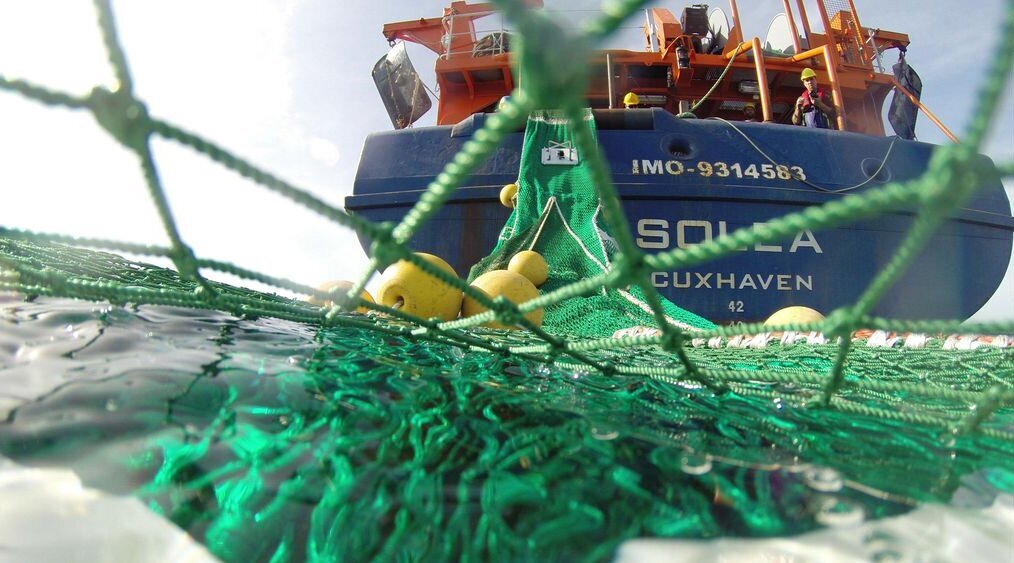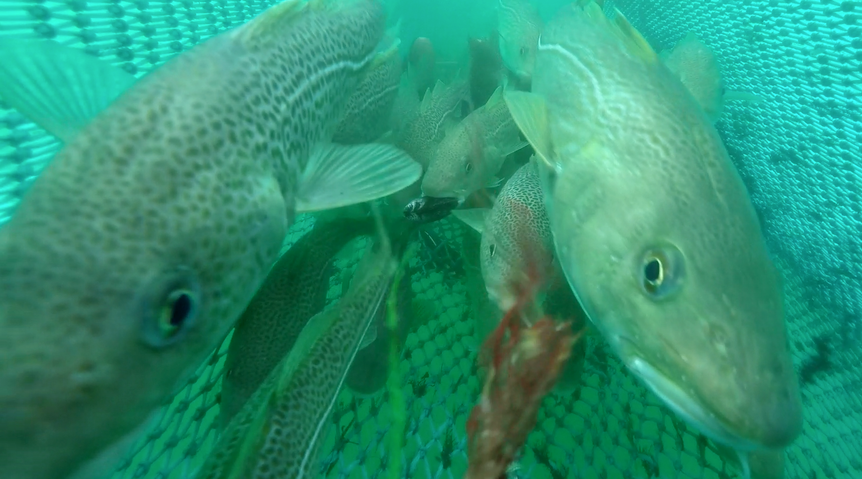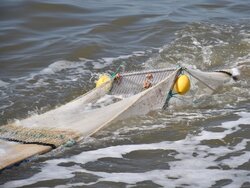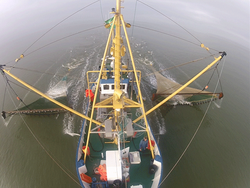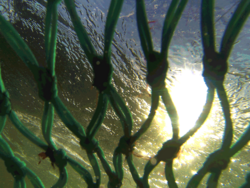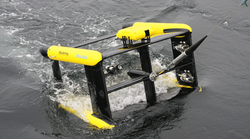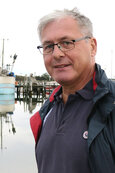Fishery will always have an impact on the marine environment, but we can try to minimise the impact as much as possible. At the same time, fisheries must not only be ecologically sustainable, but also economically sustainable. Technical innovations play a prominent role in this.
The aim of the Fisheries and Survey Technology working group is therefore to develop and test technical innovations for various fisheries that enable sustainable fishing. This applies to beam trawling in the North Sea (for sole and crab) as well as to other trawl fisheries and passive fishing with gillnets. A particular challenge is the reorientation of European fisheries policy with the introduction of a ban on discards in European waters (Field of Activity: Fisheries Management). More than ever, this requires more selective gears in which only the species and sizes desired and marketable by the fisherman are caught, or alternative fishing methods that help reducing the impact on the seabed or avoid bycatch of seabirds or sea mammals.
At the same time, fuel consumption and sorting effort on board are to be reduced to make fishing more economically sustainable as well. In addition to technical solutions for fishing, the working group supports the sea-based work of the fisheries institutes with the maintenance, development and operation of various technical devices for collecting marine data. This includes gear sensor systems, measuring systems, various remote-controlled underwater vehicles, as well as underwater observation technology.
- 0
Bromhall K, McLaverty C, Eigaard OR, Wilms Tm JG, Noack T, O'Neill FG, Dinesen GE (2026) Quantifying depletion rates of benthic macrofauna from the Danish Seine - a ‘low impact’ mobile bottom-contacting fishing gear. Fish Res 293:107611, DOI:10.1016/j.fishres.2025.107611
- 1
Herrmann B, Santos J, Sistiaga M, Brcic J, Karlsen JD, Melli V, Sala A, Veiga-Malta T, Brinkhof J, Petetta A, Yu M, Lomeli MJM, Cuende E, Feekings JP, Krag LA (2026) Rebuttal to the response by Millar and Broadhurst. Fish Res 293:107577, DOI:10.1016/j.fishres.2025.107577
- 2
Barz F, Lasner T, Dorrien C von, Döring R, Goti L, Probst WN, Kraus G, Kreiß CM, Krumme U, Reiser S, Schulze T, Stelzenmüller V, Stepputtis D, Simons SL, Strehlow HV, Zimmermann C (2025) An analysis of stakeholders' vision of the future of coastal fisheries in Germany. ICES J Mar Sci 82(6):fsaf074, DOI:10.1093/icesjms/fsaf074
- 3
Jacques N, Herrmann B, Sistiaga M, Brinkhof J, Santos J, Brinkhof I (2025) Caught on camera: quantifying fish behaviour in relation to sorting grids. Rev Fish Biol Fisheries 35(4):2281-2305, DOI:10.1007/s11160-025-10003-6
- 4
Winkler S, Hermann A, Stepputtis D (2025) Fischereibetriebe gesucht: Hydrographie-Messkampagne entlang der deutschen Ostseeküste durch Fischereifahrzeuge. Fischerblatt 73(8):16-17
- 5
Berzosa SÁ, Noack T, Santos J, Lichtenstein U, Milanelli AM, Kindt-Larsen L, Ljungberg P, Dahlke FT, Stepputtis D (2025) From semi-controlled environment to field trials: Testing pot entrance designs for Atlantic cod (Gadus morhua). Fish Res 288:107470, DOI:10.1016/j.fishres.2025.107470
- 6
Meyer S, Santos J, Krumme U (2025) High-resolution fishing activity data of gillnetters reveal unexpected fishing pattern on western Baltic cod during spawning closure. Fish Res 289:107485, DOI:10.1016/j.fishres.2025.107485
- 7
Yochum N, Lansley J, Winger P, Brcic J, Eigaard OR, Einarsson HA, Feekings JP, Hermann B, Kerry C, Larsen RB, McLaverty C, Melli V, Metcalfe K, Molenaar P, Mytilineou C, Noack T, Perez Roda A, Richardson K, Rickwood M, Stepputtis D, et al (2025) ICES-FAO Working Group on Fishing Technology and Fish Behaviour (WGFTFB). Copenhagen: ICES, 347 p, ICES Sci Rep 7(95), DOI:10.17895/ices.pub.30231325
- 8
Lansley J, Sala A, Yochum N, Brcic J, Einarsson HA, Feekings JP, Hermann B, Larsen RB, Melli V, Molenaar P, Mytilineou C, Noack T, Perez Roda A, Richardson K, Savina E, Stepputtis D, Opstal M van (2025) ICES-FAO Working Group on Fishing Technology and Fish Behaviour (WGFTFB; outputs from 2024 meeting). Copenhagen: ICES, 260 p, ICES Sci Rep 7(15), DOI:10.17895/ices.pub.28311107
- 9
Bak-Georgsen Z, Herrmann B, Santos J, Melli V, Feekings JP, Stepputtis D (2025) Size selecting for flatfish while avoiding cod. Reg Studies Mar Sci 91:104544, DOI:10.1016/j.rsma.2025.104544
- 10
Bak-Jensen Z, Herrmann B, Santos J, Stepputtis D, Melli V, Feekings JP (2025) Size selectivity of flatfish in trawl codends. Aquacult Fisheries 10(5):899-910, DOI:10.1016/j.aaf.2024.10.001
- 11
Bak-Georgsen Z, Herrmann B, Melli V, Santos J, Feekings JP (2025) Understanding and predicting codend size selection for flatfish species. Rev Fish Biol Fisheries 35(3):1445-1464, DOI:10.1007/s11160-025-09965-4
- 12
Kavanagh A, Kindt-Larsen L, Bleeker K, Boussarie G, Cox S, Astarloa Diaz A, Dorrien C von, Evans P, Fortuna C, Gruduls J, Helminen J, Jusufovski D, Kingston A, Koschinski S, Königson S, Lusseau D, Maes J, Baretto Marçalo AL, Noack T, Stepputtis D, et al (2025) Working Group on the Bycatch of Protected Species (WGBYC). Copenhagen: ICES, 199 p, ICES Sci Rep 7(112), DOI:10.17895/ices.pub.30610370
- 13
Santos J (2024) Cruise report FRV "Solea" cruise 811, 14.-29.09.2022. Rostock: Thünen Institute of Baltic Sea Fisheries, 33 p
- 14
Björner M, Furkert F, Hermann A, Wagner R, Neubert S, Naumann M (2024) Evaluation of low-cost hydrographic sensors for increased monitoring density in coastal oceans. In: 2024 IEEE Sensors Applications Symposium: July 23-25, 2024, Naples, Italy; IEEE SAS 2024 Symposium Proceedings. Piscataway, NJ, USA: IEEE, DOI:10.1109/SAS60918.2024.10636439
- 15
Yochum N, Karlsen J, Senko JF, Wang JH, Melli V, Geraci ML, Utne-Palm AC, Breen M, Cuende E, Bayse SM, Somerville J, Hermann A, Edridge A, Mackenzie E K, Ljungberg P, Chladek J-C, Opstal M van, Watson D, Lomeli MJM, Oliver M (2024) Guidelines for evaluating artificial light to mitigate unwanted fisheries bycatch. Rev Fish Sci Aquacult 32(4):612-656, DOI:10.1080/23308249.2024.2359417
- 16
Hermann A, Furkert F, Björner M, Naumann M, Stepputtis D, Gag M, Klein S (2024) HyFiVe: hydrography on fishing vessels ; A new monitoring system enables cost effective and scalable ocean monitoring. J Applied Hydrography(129):12-18, DOI:10.23784/HN129-02
- 17
Noack T, Berg F, Kindt-Larsen L (2024) Length matters: Effects of fishing gear and fishing behavior on the catch efficiency of demersal seines. Heliyon 10(18):e37953, DOI:10.1016/j.heliyon.2024.e37953
- 18
Kindt-Larsen L, Noack T, Brooks ME, Kroner A-M, Glemarec G (2024) Pearls are not just for girls: Plastic spheres do not interfere with target catches in a set net fishery. Fish Res 276:107032, DOI:10.1016/j.fishres.2024.107032
- 19
Kammann UKR, Aust M-O, Lewin W-C, Nogueira P, Panten K, Sell AF, Stepputtis D, Strehlow HV, Weltersbach MS, Wysujack K (2024) Umweltkontamination: Müll in deutschen Meeresgebieten. Braunschweig: Johann Heinrich von Thünen-Institut, 6 p, Thünen à la carte 13, DOI:10.3220/CA1701080947000
- 20
Hermann A, Stepputtis D, Furkert F, Björner M, Naumann M (2023) Hydrography on fishing vessels - a feasability study leads to an open source development. In: Proceedings of the 15th international workshop on methods for the development and evaluation of maritime technologies (DEMat), 12.-15.09.2022, Rostock, Germany. pp 91-101
- 21
Lansley J, Sala A, Stepputtis D, Brcic J, Einarsson HA, Feekings JP, Glemarec G, Hermann B, Kindt-Larsen L, Krishnan P, Ljungberg P, Melli V, Mytilineou C, Noack T, Perez Roda A, Richardson K, Yochum N (2023) ICES-FAO Working Group on Fishing Technology and Fish Behaviour (WGFTFB). Copenhagen: ICES, ix, 317 p, ICES Sci Rep 5(83), DOI:10.17895/ices.pub.24080889
- 22
Sistiaga M, Herrmann B, Brinkhof J, Larsen RB, Santos J, Stepputtis D, Brinkhof I, Jacques N, Cerbule K, Petetta A, Cuende E, Kvalvik L (2023) Is there a limit to the potential effects of shortening lastridge ropes on the size selectivity of diamond mesh codends? Fish Res 262:106671, DOI:10.1016/j.fishres.2023.106671
- 23
Santos J, Furkert F, Stepputtis D, Schütz A (2023) Neues Sortiergitter-Konzept zur Beifangreduktion in der Krabbenfischerei. Fischerblatt 71(12):21-25
- 24
Breddermann K, Lichtenstein U, Kosleck S, Stepputtis D (2023) SimuNet - Ein Werkzeug zur Fanggeräteoptimierung : Abschlussbericht. Bericht-Nr. 6316 0061-A-6/2023. Rostock: Univ Rostock; Thünen-Institut für Ostseefischerei, v, 97 p
- 25
Bak-Jensen Z, Herrmann B, Santos J, Melli V, Stepputtis D, Feekings JP (2023) The capability of square-meshes and fixed-shape meshes to control codend size selection. Fish Res 264:106704, DOI:10.1016/j.fishres.2023.106704
- 26
Hünerlage LK, Pedersen EM, Beier U, Lanssens T, Mosegaard H, Opstal M van, Schulze T, Stepputtis D, Santos J, Vlasselaer J van (2023) Working Group on Crangon Fisheries and Life History (WGCRAN). Copenhagen: ICES, 48 p, ICES Sci Rep 5(93), DOI:10.17895/ices.pub.24220471
- 27
Kratzer I, Stepputtis D, Santos J, Lütkefedder F, Stoltenberg A, Hartkens L, Schaber M, Kindt-Larsen L, Larsen F (2022) Angle-dependent acoustic reflectivity of gillnets and their modifications to reduce bycatch of odontocetes using sonar imaging. Fish Res 250:106278, DOI:10.1016/j.fishres.2022.106278
- 28
Bak-Jensen Z, Herrmann B, Santos J, Jacques N, Melli V, Feekings JP (2022) Fixed mesh shape reduces variability in codend size selection. Can J Fish Aquat Sci 79(11):1820-1829, DOI:10.1139/cjfas-2022-0049
- 29
Ellis J, Schuchert P, Alvestad AH, Auber A, Baldo F, Baudron A, Beggs S, Bland B, Börjesson P, Breddermann K, Burns F, Chaves C, Cole H, Cresson P, de Boois IJ, Kloppmann MHF, Lichtenstein U, Ludwig KE, Neumann H, Sell AF, et al (2022) International Bottom Trawl Survey Working Group (IBTSWG). Copenhagen: ICES, iv, 183 p, ICES Sci Rep 4(65), DOI:10.17895/ices.pub.20502828
- 30
Brooks ME, Melli V, Savina E, Santos J, Millar R, O'Neill FG, Veiga-Malta T, Ahm Krag L, Feekings JP (2022) Introducing selfisher: open source software for statistical analyses of fishing gear selectivity. Can J Fish Aquat Sci 79(8):1189-1197, DOI:10.1139/cjfas-2021-0099
- 31
Santos J, Stepputtis D, Oesterwind D, Herrmann B, Lichtenstein U, Hammerl C, Krumme U (2022) Reducing cod bycatch in flatfish fisheries. Ocean Coastal Manag 220:106058, DOI:10.1016/j.ocecoaman.2022.106058
- 32
Krumme U, Meyer S, Kratzer I, Chladek J-C, Barz F, Stepputtis D, Strehlow HV, Kraak SBM, Zimmermann C (2022) STELLA - Stellnetzfischerei-Lösungsansätze : Projekt-Abschlussbericht. Braunschweig: Johann Heinrich von Thünen-Institut, 220 p, Thünen Rep 97, DOI:10.3220/REP1662104969000
- 33
Meyer S, Krumme U, Stepputtis D, Zimmermann C (2022) Use of a smartphone application for self-reporting in small-scale fisheries: Lessons learned during a fishing closure in the western Baltic Sea. Ocean Coastal Manag 224:106186, DOI:10.1016/j.ocecoaman.2022.106186
- 34
Björner M, Naumann M, Furkert F, Stepputtis D, Hermann A, Gag M, Eilek S, Wagner R (2022) Using an open source approach to remotely collect reliable environmental data. In: EGU General Assembly 2022, Vienna, Austria & Online, 23-27 May 2022., DOI:10.5194/egusphere-egu22-2722
- 35
Stepputtis D, Noack T, Lichtenstein U, Hammerl C, Santos J, Mieske B (2022) Verringerungen von Kunststoffmüll aus der Krabbenfischerei durch Netzmodifikationen - Dolly Rope Suspension (DRopS) : Projekt-Abschlussbericht. Braunschweig: Johann Heinrich von Thünen-Institut, 180 p, Thünen Rep 101, DOI:10.3220/REP1670832160000
- 36
de Boois IJ, Stepputtis D, Baldo F, Bland B, Börjesson P, Breddermann K, Chaves C, Drewery J, Ellis JR, Griffin F, Hal R van, Haney G, Hatton B, Kynoch R, Le Roy D, Melli V, Pasterkamp T, Reecht Y, Rosen S, Salter B, et al (2022) Workshop on the further development of the new IBTS gear (WKFDNG). Copenhagen: ICES, 46 p, ICES Sci Rep 4(18), DOI:10.17895/ices.pub.10094
- 37
Chladek J-C, Stepputtis D, Hermann A, Ljungberg P, Rodriguez-Tress P, Santos J, Svendsen JC (2021) Development and testing of fish-retention devices for pots: transparent triggers significantly increase catch efficiency for Atlantic cod (Gadus morhua). ICES J Mar Sci 78(1):199-219, DOI:10.1093/icesjms/fsaa214
- 38
Kratzer I (2021) Gillnet modifications to reduce bycatch of harbor porpoises. DTU Aqua National Institute of Aquatic Resources, 172 p, Lyngby, Techn Univ of Denmark, Section for Ecosystem Based Marine Management, PhD Thesis
- 39
Polte P, Gröhsler T, Kotterba P, Nordheim L von, Moll D, Santos J, Rodriguez-Tress P, Zablotski Y, Zimmermann C (2021) Reduced reproductive success of Western Baltic herring (Clupea harengus) as a response to warming winters. Front Mar Sci 8:589242, DOI:10.3389/fmars.2021.589242
- 40
Günther C, Temming A, Santos J, Berkenhagen J, Stepputtis D, Schultz S, Neudecker T, Kraus G, Bethke E, Hufnagl M (2021) Small steps high leaps: Bio-economical effects of changing codend mesh size in the North Sea Brown shrimp fishery. Fish Res 234:105797, DOI:10.1016/j.fishres.2020.105797
- 41
Kratzer I, Brooks ME, Bilgin S, Ozdemir S, Kindt-Larsen L, Larsen F, Stepputtis D (2021) Using acoustically visible gillnets to reduce bycatch of a small cetacean: first pilot trials in a commercial fishery. Fish Res 243:106088, DOI:10.1016/j.fishres.2021.106088
- 42
Chladek J-C, Stepputtis D, Hermann A, Kratzer I, Ljungberg P, Rodriguez-Tress P, Santos J, Svendsen JC (2021) Using an innovative net-pen-based observation method to assess and compare fish pot-entrance catch efficiency for Atlantic cod (Gadus morhua). Fish Res 236:105851, DOI:10.1016/j.fishres.2020.105851
- 43
Stepputtis D, Santos J, Mieske B, Lichtenstein U, Schütz A, Stechert R (2020) Abschlussbericht an das Ministerium für Landwirtschaft und Umwelt Mecklenburg-Vorpommern für das Projekt CODEX (CodExcluder) - Netzmodifikation zur Reduktion des Dorschbeifanges. Rostock: Thünen Institute of Baltic Sea Fisheries, 99 p
- 44
Herrmann B, Sistiaga M, Larsen RB, Brinkhof J, Gjøsund SH, Jacques N, Santos J (2020) Catch pattern and size selectivity for a gear designed to prevent fish injuries during the capture process in a North-East Atlantic demersal trawl fishery. Reg Studies Mar Sci 40:101525, DOI:10.1016/j.rsma.2020.101525
- 45
Kratzer I, Schäfer I, Stoltenberg A, Chladek J-C, Kindt-Larsen L, Larsen F, Stepputtis D (2020) Determination of optimal acoustic passive reflectors to reduce bycatch of odontocetes in gillnets. Front Mar Sci 7:539, DOI:10.3389/fmars.2020.00539
- 46
Dau K, Stolte A, Lichtenstein U, Möllmann N, Oberdörffer P, Wegner K, Werner S, Wichmann W (2020) Empfehlungen zur Entsorgung von Fanggeräten aus der Fischerei : AG Seebasierte Einträge des Runden Tisches Meeresmüll Unterarbeitsgruppe "Netzentsorgung" [online]. Hannover: Niedersächsisches Ministerium für Umwelt, Energie, Bauen und Klimaschutz, 37 p, zu finden in <http://www.muell-im-meer.de> [zitiert am 10.12.2020]
- 47
Shantha Kumar RS, Hermann A, Stepputtis D (2020) Hierarchical classification, counting and length measurement of fish using a stacking model approach. In: Heizmann M, Längle T (eds) Forum Bildverarbeitung 2020. Karlsruhe: KIT Scientific Publishing, pp 351-362, DOI:10.5445/KSP/1000124383
- 48
Rijnsdorp AD, Opstal M van, Boute P, Bremmer J, Fox CJ, Lankheet M, Molenaar P, Polet H, Schram E, Servili A, Stepputtis D, Tiano J (2020) ICES Working Group on Electrical Trawling (WGELECTRA). Copenhagen: ICES, 108 p, ICES Sci Rep 2(37), DOI:10.17895/ices.pub.6006
- 49
Hermann A, Chladek J-C, Stepputtis D (2020) iFO (infrared Fish Observation) - An open source low-cost infrared underwater video system. HardwareX 8:e00149, DOI:10.1016/j.ohx.2020.e00149
- 50
Sistiaga M, Herrmann B, Brinkhof J, Larsen RB, Jacques N, Santos J, Gjøsund SH (2020) Quantification of gear inflicted damages on trawl-caught haddock in the Northeast Atlantic fishery. Mar Pollut Bull 157:111366, DOI:10.1016/j.marpolbul.2020.111366
- 51
Santos J, Herrmann B, Stepputtis D, Kraak SBM, Gökce G, Mieske B (2020) Quantifying the performance of selective devices by combining analysis of catch data and fish behaviour observations: methodology and case study on a flatfish excluder. ICES J Mar Sci 77(7-8):2840-2856, DOI:10.1093/icesjms/fsaa155
- 52
Polet H, Rindorf A, Konrad C, Vasilakopoulos P, Kraak SBM, Stepputtis D, Döring R, Stransky C, Bastardie F, Basterretxea M, De Carlo F, Feekings JP, Glemarec G, Königson S, Miehault S, Moutopoulos D, Reid D, Rihan D, Sala A, Valeiras J, et al (2020) Scientific, Technical and Economic Committee for Fisheries (STECF) - Review of technical measures (part 1) (STECF-20-02). Luxembourg: Publications Office of the European Union, 201 p, JRC Sci Pol Rep, DOI:10.2760/734593
- 53
Chladek J-C, Culik B, Kindt-Larsen L, Moesgaard Albertsen C, Dorrien C von (2020) Synthetic harbour porpoise (Phocoena phocoena) communication signals emitted by acoustic alerting device (Porpoise ALert, PAL) significantly reduce their bycatch in western Baltic gillnet fisheries. Fish Res 232:105732, DOI:10.1016/j.fishres.2020.105732
- 54
Stepputtis D, Santos J, Zimmermann C (2020) Technical approaches to avoid cod catches in Baltic Sea trawl fisheries : A report for the BALTFISH high level group. Rostock: Thünen Institute of Baltic Sea Fisheries, 37 p
- 55
Schartmann H (2019) Activity pattern of the harbour por-poise Phocoena phocoena in the coastal waters of Fyn (Denmark). Rostock: Univ Rostock, 189 p, Rostock, Univ, Masterarbeit
- 56
Noack T, Stepputtis D, Madsen N, Wieland K, Haase S, Krag LA (2019) Gear performance and catch process of a commercial Danish anchor seine. Fish Res 211:204-211, DOI:10.1016/j.fishres.2018.11.012
- 57
Stötera S, Degen-Smyrek AK, Krumme U, Stepputtis D, Bauer Robert, Limmer B, Hammer C (2019) Marking otoliths of Baltic cod (Gadus morhua Linnaeus, 1758) with tetracycline and strontium chloride. J Appl Ichthyol 35(2):427-435, DOI:10.1111/jai.13829
- 58
Hermann A, Stepputtis D, Rödiger M, Hensel J (2019) Open Scientific Measurement Board (OpenSMB). ICES Sci Rep 1(61):30-31
- 59
Eero M, Carlshamre S, Stepputtis D, Krumme U, Maioli F, Prista N, Schade FM, Santos J, Noack T, Valentinsson D, Nilsson H, Feekings JP, Storr-Paulsen M, Plikshs M, Bergström U, Håkansson KB, Radtke K (2019) Report on eastern baltic cod bycatch in non-targeted fisheries, mixing with western baltic cod in SD24, and stock situation in SDS 27-32. Copenhagen: ICES, 69 p, ICES Sci Rep 1(76), DOI:10.17895/ices.pub.5635
- 60
Larsen RB, Sistiaga M, Herrmann B, Brinkhof J, Tatone I, Santos J (2019) The effect of Nordmøre grid length and angle on codend entry of bycatch fish species and shrimp catches. Can J Fish Aquat Sci 76(2):308-319, DOI:10.1139/cjfas-2018-0069
- 61
Kraak SBM, Haase S, Minto C, Santos J (2019) The Rosa Lee phenomenon and its consequences for fisheries advice on changes in fishing mortality or gear selectivity. ICES J Mar Sci 76(7):2179-2192, DOI:10.1093/icesjms/fsz107
- 62
Larsen RB, Herrmann B, Sistiaga M, Brinkhof J, Santos J (2018) Catch and release patterns for target and bycatch species in the Northeast Atlantic deep-water shrimp fishery: Effect of using a sieve panel and a Nordmøre grid. PLOS One 13(12):e0209621, DOI:10.1371/journal.pone.0209621
- 63
Hermann A, Stepputtis D (2018) Cruise Report FRV Walther Herwig III Cruise WH415. 14 p
- 64
Yulianto I, Booth H, Ningtias P, Kartaqijaya T, Santos J, Sarmintohadi, Kleinertz S, Campbell SJ, Palm HW, Hammer C (2018) Practical measures for sustainable shark fisheries: Lessons learned from an Indonesian targeted shark fishery. PLOS One 13(11):e0206437, DOI:10.1371/journal.pone.0206437
- 65
Santos J, Herrmann B, Stepputtis D, Günther C, Limmer B, Mieske B, Schultz S, Neudecker T, Temming A, Hufnagl M, Bethke E, Kraus G (2018) Predictive framework for codend size selection of brown shrimp (Crangon crangon) in the North Sea beam-trawl fishery. PLOS One 13(7):e0200464, DOI:10.1371/journal.pone.0200464
- 66
Dorrien C von, Chladek J-C (2018) Sicherung der Wettbewerbsfähigkeit der deutschen Fischerei durch Entwicklung innovativer, praxistauglicher PAL-Warngeräte zur Minimierung von Schweinswal-Beifängen - Schlussbericht des Teilprojektes 1. Rostock: Thünen-Institut für Ostseefischerei, 17 p
- 67
Santos J, Herrmann B, Mieske B, Krag LA, Haase S, Stepputtis D (2018) The efficiency of sieve-panels for bycatch separation in Nephrops trawls. Fish Manag Ecol 25(6):464-473, DOI:10.1111/fme.12323
- 68
Kanstinger P, Beher J, Grenzdörffer G, Hammer C, Huebert KB, Stepputtis D, Peck M (2018) What is left? Macrophyte meadows and Atlantic herring (Clupea harengus) spawning sites in the Greifswalder Bodden, Baltic Sea. Estuar Coast Shelf Sci 201:72-81, DOI:10.1016/j.ecss.2016.03.004
- 69
Culik B, Conrad M, Chladek J-C (2017) A new warning device. Tracks (CMS)(Ausg. COP12):82-83
- 70
Culik B, Conrad M, Chladek J-C (2017) Akustischer Schutz für Meeressäuger: neues Warngerät PAL. In: Fortschritte der Akustik - DAGA 2017 : 43. Jahrestagung für Akustik, 06.-09. März 2017 in Kiel. Berlin: Deutsche Gesellschaft für Akustik eV (DEGA), pp 387-390
- 71
Santos J (2017) Bericht über die 725. Reise des FFS Solea vom 07.09 bis 23.09.2016 : Fahrtleitung: Juan Santos. Rostock: Thünen-Institut für Ostseefischerei, 44 p
- 72
Noack T, Frandsen RP, Krag LA, Mieske B, Madsen N (2017) Codend selectivity in a commercial Danish anchor seine. Fish Res 186:283-291, DOI:10.1016/j.fishres.2016.10.006
- 73
Noack T, Madsen N, Mieske B, Frandsen RP, Wieland K, Krag LA (2017) Estimating escapement of fish and invertebrates in a Danish anchor seine. ICES J Mar Sci 74(9):2480-2488, DOI:10.1093/icesjms/fsx066
- 74
Chladek J-C, Kindt-Larsen L, Culik B, Conrad M, Dorrien C von (2017) Listen to your PAL! Innovative alerting device significantly reduces western Baltic harbour porpoise bycatch : Poster for European Cetacean Society Conference 2017. Hamburg: Johann Heinrich von Thünen-Institut, 1 p
- 75
Santos J, Stepputtis D (2017) Report of the Cruise N 739, by the FRV Solea from 12:09 to 28:09:2017 Cruise leaders Juan Santos & Dr. Daniel Stepputtis. Rostock: Thünen-Institut für Ostseefischerei, 26 p
- 76
Alonso-Fernandez A, Otero J,, Banon R, Compelos JM, Santos J, Mucientes G (2017) Sex ratio variation in an exploited population of common octopus: ontogenic shifts and spatio-temporal dynamics. Hydrobiologia 794(1):1-16, DOI:10.1007/s10750-016-3065-3
- 77
Santos J (2016) Bericht über die 709. Reise des FFS Solea vom 09.09 bis 26.09.2015 : Fahrtleitung: Juan Santos. Rostock: Thünen-Institut für Ostseefischerei, 16 p
- 78
Stepputtis D, Santos J, Herrmann B, Mieske B (2016) Broadening the horizon of size selectivity in trawl gears. Fish Res 184:18-25, DOI:10.1016/j.fishres.2015.08.030
- 79
Rau A, Hogh T, Koth M, Dressler S, Schöps K, Enkelmann D, Auch D, Bühler A (2016) Cruise report : FRV "Solea" Cruise 720 ; 26.05.-07.06.2016 ; Investigation of the demersal fish fauna in the German Baltic Sea (BaltBox). Rostock: Thünen Institute of Baltic Sea Fisheries, 3 p
- 80
Santos J, Mieske B, Stepputtis D, Krag LA, Herrmann B (2016) Development and testing of HESPAN, a sievenet-based BRD for nephrops trawl fisheries : Bericht über die 709. Reise des FFS Solea vom 09.09. bis 25.09.2015. Rostock: Thünen-Institut für Ostseefischerei, 18 p
- 81
Santos J (2016) El pez plano que utilizó la ventana y se largó. Pesca Internacional 17(175):35-37
- 82
Mieske B, Böttcher U, Stepputtis D, Hermann A, Geraert L, Verschueren B, Naumann M, Breddermann K (2016) Fahrtbericht über die 298. und 299. Reise des FFS "Clupea" vom 24.11. bis 18.12.2015 und vom 06.01. bis 05.02.2016. Rostock: Thünen-Institut für Ostseefischerei, 22 p
- 83
Herrmann B, Sistiaga M, Santos J, Sala A (2016) How many fish need to be measured to effectively evaluate trawl selectivity? PLOS One 11(8):e0161512, DOI:10.1371/journal.pone.0161512
- 84
Haase S, Santos J (2016) Jovenes y ancianos primero : Puesta en práctica de un nuevo concepto de selectividad para la pesca de arrastre. Pesca Internacional(11):16-20
- 85
Santos J, Herrmann B, Mieske B, Stepputtis D, Krumme U, Nilsson H (2016) Reducing flatfish bycatch in roundfish fisheries. Fish Res 184:64-73, DOI:10.1016/j.fishres.2015.08.025
- 86
Oesterwind D, Dewitz B von, Döring R, Eero M, Goti L, Kotta J, Nurske K, Ojaveer H, Rau A, Skov H, Stepputtis D, Zaiko A (2016) Review on patterns and dynamics of drivers of biodiversity (species, communities, habitats) across Baltic Sea ecosystems in space and time including socio-economy : BIO-C3 Deliverable, D3.1. 102 p, DOI:10.3289/BIO-C3_D3.1
- 87
Santos J, Herrmann B, Otero P, Fernandez J, Perez N (2016) Square mesh panels in demersal trawls: does lateral positioning enhance fish contact probability? Aquatic Liv Res 29(3):1-10, DOI:10.1051/alr/2016025
- 88
Santos J, Mieske B, Stepputtis D (2016) Testing FLEX, a FLatfish EXcluder device for trawl fisheries : Bericht über die 696. Reise des FFS Solea vom 12.11. bis 21.11.2014. Rostock: Thünen-Institut für Ostseefischerei, 16 p
- 89
Schulz J, Möller KO, Bracher A, Hieronymi M, Cisewski B, Barz K, Gröger JP, Stepputtis D, et al (2015) Aquatische optische Technologien in Deutschland [online]. Warnemünde: Leibniz-Institut für Ostseeforschung, 92 p, Meereswiss Ber 97, zu finden in <http://www.io-warnemuende.de/tl_files/forschung/meereswissenschaftliche-berichte/mebe97_2015-schulz.pdf> [zitiert am 15.12.2015]
- 90
Mieske B, Schöps K, Spotowitz L, Spisla C, Rahmann K, Thiele W (2015) Fahrtbericht über die 287. und 288. Reise des FFS "Clupea" vom 24.11. bis 19.12.2014 und vom 06.01 bis 06.02.2015. Rostock: Thünen-Institut für Ostseefischerei, 18 p
- 91
Hahn T, Stepputtis D (2015) Freiheit für die Flunder. Süddt Zeitg(32):18
- 92
Schultz S, Günther C, Santos J, Berkenhagen J, Bethke E, Hufnagl M, Kraus G, Limmer B, Stepputtis D, Temming A, Neudecker T (2015) Optimierte Netz-Steerte für eine ökologisch und ökonomisch nachhaltige Garnelenfischerei in der Nordsee (CRANNET) : Projektabschlussbericht. Hamburg; Rostock: Johann Heinrich von Thünen-Institut; Universität Hamburg, Institut für Hydrobiologie und Fischereiwissenschaften, 374 p
- 93
Zimmermann C, Kraak SBM, Krumme U, Santos J, Stötera S, Nordheim L von (2015) Research for PECH Committee - Options of handling choke species in the view of the EU Landing Obligation – The Baltic plaice example : study. Brussels: European Union, 100 p, DOI:10.2861/808965
- 94
Herrmann B, Wienbeck H, Stepputtis D, Ahm Krag L, Feekings JP, Moderhak W (2015) Size selection in codends made of thin-twined Dyneema netting compared to standard codends: a case study with cod, plaice and flounder. Fish Res 167:82-91, DOI:10.1016/j.fishres.2015.01.014
- 95
Krag LA, Herrmann B, Karlsen J, Mieske B (2015) Species selectivity in different sized topless trawl designs: Does size matter? Fish Res 172:243-249, DOI:10.1016/j.fishres.2015.07.010
- 96
Stepputtis D, Zimmermann C, Krumme U, Dorrien C von (2015) Technical measures in the Baltic Sea - an alternative to over-regulation and the brace-and-belt approach : in-depth analysis. Brussels: European Parliament Policy Department B: Structural and Cohesion Policies, 42 p
- 97
Herrmann B, Wienbeck H, Karlsen J, Stepputtis D, Dahm E, Moderhak W (2015) Understanding the release efficiency of Atlantic cod (Gadus morhua) from trawls with a square mesh panel: effects of panel area, panel position, and stimulation of escape response. ICES J Mar Sci 72(2):686–696, DOI:10.1093/icesjms/fsu124
- 98
Wienbeck H, Herrmann B, Feekings JP, Stepputtis D, Moderhak W (2014) A comparative analysis of legislated and modified Baltic Sea trawl codends for simultaneously improving the size selection of cod (Gadus morhua) and plaice (Pleuronectes platessa). Fish Res 150:28-37, DOI:10.1016/j.fishres.2013.10.007
- 99
Bauer RK, Gräwe U, Stepputtis D, Zimmermann C, Hammer C (2014) Identifying the location and importance of spawning sites of Western Baltic herring using a particle backtracking model. ICES J Mar Sci 71(3):499-509, doi:10.1093/icesjms/fst163
- 100
Hanel R, Stepputtis D, Bonhommeau S, Castonguay M, Schaber M, Wysujack K, Vobach M, Miller MJ (2014) Low larval abundance in the Sargasso Sea: new evidence about reduced recruitment of the Atlantic eels. Naturwiss 101(12):1041-1054, DOI:10.1007/s00114-014-1243-6
- 101
Dorrien C von, Hammer C, Zimmermann C, Stepputtis D, Stuermer IW, Kotterba P, Polte P (2013) A review on herring Clupea harengus (Actinopterygii: Clupeiformes: Clupeidae) recruitment and early life stage ecology in the Western Baltic Sea. Acta Ichth Piscat 43(3):169-182, doi:10.3750/AIP2013.43.3.01
- 102
Jung C, Zimmermann C, Stepputtis D, Wätjen K (2013) Allianz für das Meer. Bild Wissensch(3):18-24
- 103
Miller MJ, Stepputtis D, Bonhommeau S, Castonguay M, Schaber M, Vobach M, Wysujack K, Hanel R (2013) Comparisons of catches of large leptocephali using an IKMT and a large pelagic trawl in the Sargasso Sea. Mar Biodiv 43(4):493-501, DOI:10.1007/s12526-013-0170-7
- 104
Herrmann B, Mieske B, Stepputtis D, Krag LA, Madsen N, Noack T (2013) Modelling towing and haul-back escape patterns during the fishing process: a case study for cod, plaice, and flounder in the demersal Baltic Sea cod fishery. ICES J Mar Sci 70(4):850-863, DOI:10.1093/icesjms/fst032
- 105
Herrmann B, Wienbeck H, Moderhak W, Stepputtis D, Krag LA (2013) The influence of twine thickness, twine number and netting orientation on codend selectivity. Fish Res 145:22-36, DOI:10.1016/j.fishres.2013.03.002
- 106
Bernreuther M, Schmidt JO, Stepputtis D, Temming A (2013) Vertically resolved prey selectivity and competition of Baltic herring Clupea harengus and sprat Sprattus sprattus. Mar Ecol Progr Ser 489:177-195, doi:10.3354/meps10405
- 107
Bauer RK, Stepputtis D, Gräwe U, Zimmermann C, Hammer C (2013) Wind-induced variability in coastal larval retention areas: a case study on Western Baltic spring-spawning herring. Fisheries Oceanogr 22(5):388-399, DOI:10.1111/fog.12029
- 108
Mieske B (2012) Abschätzung der Leinenlängen von Schleppnetzen mit unterschiedlichen Scher- und Netzöffnungsbreiten in der Doppelnetztechnologie. 8 p
- 109
Oeberst R, Velasco A, Mieske B (2012) Measuring the international standard trawl for Baltic demersal surveys (TV3-520 Meshes) : working paper Working group of Baltic International Fish Survey, 26 – 30 March 2012. Copenhagen: ICES, 4 p
- 110
Kratzer I (2012) Pulse beam trawling vs. traditional beam trawling in German shrimp fishery: a comparative study. Rostock: Univ Rostock, 114 p, Rostock, Univ, Masterarbeit, 2012
- 111
Voss R, Peck M, Hinrichsen HH, Clemmesen C, Baumann H, Stepputtis D, Bernreuther M, Schmidt JO, Temming A, Köster FW (2012) Recruitment processes in Baltic sprat : a re-evaluation of GLOBEC Germany hypotheses. Progr Oceanogr 107:61-79, DOI:10.1016/j.pocean.2012.05.003
- 112
Mieske B (2012) Versuche zur Verringerung des Dorschbeifanges in Grundschleppnetzen . Inf Fischereiforsch 59:39-47, DOI:10.3220/Infn59_39-47_2012
- 113
Stepputtis D, Hinrichsen HH, Böttcher U, Götze E, Mohrholz V (2011) An example of meso-scale hydrographic features in the central Baltic Sea and their influence on the distribution and vertical migration of sprat, Sprattus sprattus balticus (Schn.). Fisheries Oceanogr 20(1):82-88, DOI:10.1111/j.1365-2419.2010.00567.x
- 114
Probst WN, Berth U, Stepputtis D, Hammer C (2011) Catch patterns of the German Baltic Sea trawl fleet targeting demersal species between 2006 and 2009. Acta Ichth Piscat 41(4):315-325, DOI:10.3750/AIP2011.41.4.08
- 115
Wienbeck H, Herrmann B, Moderhak W, Stepputtis D (2011) Effect of netting direction and number of meshes around on size selection in the codend for Baltic cod (Gadus morhua). Fish Res 109(1):80-88, DOI:10.1016/j.fishres.2011.01.019
- 116
Voss R, Hinrichsen HH, Stepputtis D, Bernreuther M, Huwer B, Neumann V, Schmidt JO (2011) Egg mortality: predation and hydrography in the Central Baltic. ICES J Mar Sci 68(7):1379-1390, doi:10.1093/icesjms/fsr061
- 117
Oeberst R, Velasco A, Mieske B (2011) Measuring the international standard trawl for Baltic demersal surveys (TV3-520 Meshes) : working paper Working group of Baltic International Fish Survey, 21 – 25 March 2011. 5 p
- 118
Bauer RK, Stepputtis D, Gräwe U, Zimmermann C, Hammer C (2011) Retention of Western Baltic herring larvae within the main spawning area. Copenhagen: ICES, 11 p, ICES Council Meet Paper CM 2011/L:11
- 119
Krag LA, Herrmann B, Mieske B, Karlsen J (2011) Test og demonstration af en selektiv toplos trawl i Nordsoen. Kopenhagen: Ministeriet for Fødevarer Landbrug og Fiskeri Fødevareerhverv, 38 p
- 120
Stepputtis D, Wienbeck H, Herrmann B (2010) Annex D: Changes in technical measures and selectivity in the Baltic cod trawl fisheries 1999-2010. In: Simmonds J, Zimmermann C, Eero M, Berkenhagen J, Motova A, Nielsen R (eds) Report of the Sub Group on Management Objectives and Strategies (SGMOS 10-06) : Part e) Evaluation of multi-annual plan for Baltic cod ; 18-22 October 2010, Vigo. Luxembourg: Publications Office of the European Union, pp 64-73
- 121
Mieske B (2010) Bericht über die 630. Reise des FFS "Solea" vom 21.11. bis 29.11.2010. Rostock: vTI, 16 p
- 122
Bauer RK, Stepputtis D, Storr-Paulsen M, Weigelt R, Hammer C (2010) Estimating abundances of 0-group western Baltic cod by using pound net fisheries. Inf Fischereiforsch 57:1-11, DOI:10.3220/Infn57_1-11_2010
- 123
Götze E, Stepputtis D, Genç Yasar, Zengin M, Ak O, Günes E, Canatalay S (2010) Manual for the Turkish Acoustic Survey (TAS) : Project Report TR07-AG-01/Turkey/Introduction of Stock Assessment to the Fisheries Mangement System of Turkey - TIFSA. Trabzon, 28 p
- 124
Hammer C, Zimmermann C, Dorrien C von, Stepputtis D, Oeberst R (2009) Begutachtung der Relevanz der Auswirkung des Kühlwassers des geplanten Steinkohlekraftwerks in Lubmin auf die fischereilich genutzten marinen Fischbestände der westlichen Ostsee (Hering, Dorsch, Flunder, Scholle, Hornhecht) : Umweltgutachten für das Ministerium für Landwirtschaft, Umwelt und Verbraucherschutz Mecklenburg-Vorpommern, vertreten durch das Staatliche Amt für Umwelt- und Naturschutz Stralsund. Rostock: vTI, 280 p
- 125
Hammer C, Zimmermann C, Dorrien C von, Stepputtis D, Oeberst R (2009) Begutachtung der Relevanz des Kühlwassers des geplanten Steinkohlekraftwerks in Lubmin auf die fischereilich genutzten marinen Fischbestände der westlichen Ostsee (Hering, Dorsch, Flunder, Scholle, Hornhecht) : Endbericht. Rostock: vTI, 278 p
- 126
Rehberg S, Stepputtis D, Hammer C, Zimmermann C (2009) Diel differences in catches of Western Baltic Spring Spawning Herring Larvae (Clupea harengus). Inf Fischereiforsch 56:23-34, DOI:10.3220/Infn56_23-34_2009
- 127
Stepputtis D, Zimmermann C, Paustian J, Elsner U (2009) Fehmarn-Discardprojekt kann 2009 doch nicht starten : rechtlicher Rahmen in der EU für das Testen innovativer Managementansätze zu eng. Fischerblatt 57(3):9-11
- 128
Mieske B (2009) Reduzierung von Dorschbeifang bei der Plattfischfischerei. Fischerblatt 57(2):22
- 129
Gröhsler T, Stepputtis D, Krieger A, Jantschik P, Weigelt R, Storr-Paulsen M, Vitale F, Karnicki Z (2009) Studies and pilot projects for carrying out the common fisheries policy : Lot 8 ; Joint data collection between the fishing sector and the scientific community in the Baltic Sea ; Report of Project FISH/2006/15-Lot 8 for the European Commission DG fish. 208 p
- 130
McCurdy WJ, Anastasopoulou A, Berth U, de Boois IJ, Bolle LJ, Cardador F, Jardim E, Mahé K, Modin J, Moksness E, Murenu M, Mytilineou C, Pforr I, Piñeiro CG, Quincoces I, Rauthe N, Rüßmann HW, Sjöberg R, Stepputtis D, Stransky C, et al (2009) WebGR - storing images of biological material and creating a framework to promote the implementation of sound statistical analysis in age calibration. Copenhagen: ICES, 7 p
- 131
Mieske B (2008) Bericht über die Charterfahrt mit den Kuttern MAA01 und MAA10 zum Test von einem aus Platten und Rollern kombiniertem Grundtauvorgeschirr vom 14.10. bis 17.10.2008 : Einschätzung der Beeinflussung des Meeresbodens durch Grundtauvorgeschirre mit Platten in den Flügeln im Vergleich zu durchgehend aus Rollern bestehenden Vorgeschirren, abschätzende Tests zur Einsparung von Treibstoff durch das aus Platten und Rollern kombinierte Vorgeschirr. Rostock: vTI, 9 p
- 132
Mieske B (2008) Neuartiges Grundtauvorgeschirr getestet. Fischerblatt(11):18-23
- 133
Mieske B (2008) Verringerung der Dorschbeifänge in der Schleppnetzfischerei auf Plattfische mit einem im Oberblatt reduziertem Grundschleppnetz. Inf Fischereiforsch 55:25-35, DOI:10.3220/Infn55_25-35_2008
- 134
Mieske B (2007) Alternative Fangmethoden aus der Sicht der Fischereiforschung. Inf Fischereiforsch 54:46-50, DOI:10.3220/Infn54_46-50_2007
- 135
Götze E, Böttcher U, Stepputtis D, Gröhsler T (2007) Baltic Acoustic Spring Survey (BASS) in 1999-2005. ICES WGBIFS Rep 2007:191-198
- 136
Mieske B (2007) Ein Vorschlag zur Senkung des Schleppwiderstandes von Grundschleppnetzen. Inf Fischereiforsch 54:43-45, doi:10.3220/Infn54_43-45_2007
- 137
Mieske B, Oeberst R, Ubl C, Richter U (2006) Der Haftwasseranteil bei Heringsanlandungen über Bandwaagen. Inf Fischereiforsch 53:23-26, DOI:10.3220/Infn53_23-26_2006
- 138
Mieske B, Oeberst R, Ubl C, Richter U (2006) Vom Kutter auf die Waage : der Wasseranteil beim Löschen des Heringsfangs. Fischerblatt 54(7):16-18
- 139
Mieske B, Oeberst R, Ubl C, Richter U (2006) Vom Kutter auf die Waage : der Wasseranteil beim Löschen des Heringsfangs. Forschungsreport Ernähr Landwirtsch Verbrauchersch(1):40-43
- 140
Mieske B, Oeberst R, Ubl C, Richter U (2005) Der Anteil Transportwasser bei Heringsanlandungen mittels Vakuumsauganlage in Großraumbehältern. Inf Fischereiforsch 52:51-57, DOI:10.3220/Infn52_51-57_2005
- 141
Mieske B (2004) Horizontale Trennblätter in Trawls zur Verringerung von Discards in der Ostsee. Inf Fischwirtsch Fischereiforsch 51(1):11-17
- 142
Mieske B (2003) Test von Fanggeräten zur Untersuchung von Grundfischfaunen in Windparkgebieten der Ostsee. Inf Fischwirtsch Fischereiforsch 50(2):62-70
- 143
Kloppmann MHF, Böttcher U, Damm U, Ehrich S, Mieske B, Schultz N, Zumholz K (2002) Erfassung von FFH-Anhang II-Fischarten in der deutschen AWZ der Nord- und Ostsee : Abschlussbericht der Bundesforschungsanstalt für Fischerei über die Ergebnisse der naturschutzorientierten AWZ Forschung zum Schutzgut . Hamburg: Bundesforschungsanstalt für Fischerei
- 144
Mieske B (2002) Veränderungen in Fischgesellschaften - mit welchem Schleppnetz kann man sie nachweisen? Inf Fischwirtsch Fischereiforsch 49(2/3):71-80
- 145
Mieske B (2001) Die Chance zu überleben : das Schicksal der "Discards" in der Ostsee. Forschungsrep Verbrauchersch Ernährung Landwirtsch(1):42-45
- 146
Mieske B (1998) Zerlegbare Netzkäfig-Pontonrahmen : technische Entwicklung des Instituts für Ostseefischerei. Inf Fischwirtsch Fischereiforsch 45(3):123-132

![[Translate to English:] [Translate to English:]](/media/_processed_/d/7/csm_Startseite-OF_03_c0dfd6e750.png)
![[Translate to English:] [Translate to English:]](/media/_processed_/a/3/csm_20181116-151457-Stella-Jerome-Fischfalle-Warnem%C3%BCnde-Dorsche-im-Netzk%C3%A4fig-5691_heller_3050c72fa2.png)
